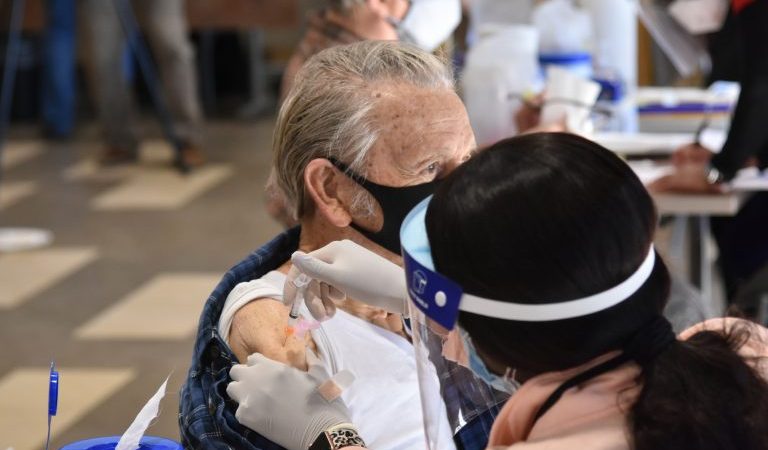‘I Don’t Know How Much Longer We Can Do This’: Alabama State Health Officer Frustrated As COVID Cases Surge
A man from Vestavia Hills receives his COVID vaccine. Less than 50% of Alabamians are vaccinated against COVID-19.
Alabama remains in the crosshairs as the COVID-19 pandemic shows no signs of relenting.
“We’re really in a crisis situation. We’ve said that over and over for several weeks,” said Alabama State Health Officer Dr. Scott Harris, in a briefing this morning. “I don’t know how much longer we’re going to be able to do this.”
Case numbers and hospitalizations continue to surge. Hospitalizations are at around 2,900, slightly below the peak in January. With a rise in deaths as well, Harris once again encouraged Alabamians to get vaccinated, especially now that the Pfizer vaccine has been granted full FDA approval.
This week was especially bad for schools. There were 5,571 cases, a 700% increase in cases for school-aged children compared to this time a year ago. The Alabama Department of Public Health does not know how many of those children caught COVID in schools, but it launched a database Friday where people can now see the number of COVID cases in their school district.
Harris emphasized that the way to keep children in schools is to vaccinate those who are eligible and to enforce universal masking regardless of vaccination status. Those who follow the guidelines of three feet of spacing and wearing masks are not considered close contact and therefore do not need to be quarantined when there is an infection.
“We have been told that our guidance has been confusing,” he said. “Our guidance is crystal clear.”
With only 29% of 12-17-year-olds vaccinated, he called on parents to vaccinate their children.
The Department of Public Health is also working to increase the availability of monoclonal antibody treatment, a COVID treatment, but emphasized they are not a substitute for vaccination.
“Monoclonals are a great option for us to have, but they represent a secondary option. What we want is for people to be vaccinated in as many cases as possible,” Harris said.
Alabama has made one of the biggest jumps in the country when it comes to the percentage of people vaccinated, but that percentage still trails behind the rest of the country.
“We don’t know how to convince people to take good advice. We understand people have made this some issue about personal choice,” Harris said. “And we respect people’s personal choice, but there’s right choices and there’s wrong choices. And if you’re not getting vaccinated, you’re making the wrong choice. And it doesn’t just affect you.”
Birmingham is 3rd worst in the Southeast for ozone pollution, new report says
The American Lung Association's "State of the Air" report shows some metro areas in the Gulf States continue to have poor air quality.
Why haven’t Kansas and Alabama — among other holdouts — expanded access to Medicaid?
Only 10 states have not joined the federal program that expands Medicaid to people who are still in the "coverage gap" for health care
Once praised, settlement to help sickened BP oil spill workers leaves most with nearly nothing
Thousands of ordinary people who helped clean up after the 2010 BP oil spill in the Gulf of Mexico say they got sick. A court settlement was supposed to help compensate them, but it hasn’t turned out as expected.
Q&A: How harm reduction can help mitigate the opioid crisis
Maia Szalavitz discusses harm reduction's effectiveness against drug addiction, how punitive policies can hurt people who need pain medication and more.
The Gulf States Newsroom is hiring a Community Engagement Producer
The Gulf States Newsroom is seeking a curious, creative and collaborative professional to work with our regional team to build up engaged journalism efforts.
Gambling bills face uncertain future in the Alabama legislature
This year looked to be different for lottery and gambling legislation, which has fallen short for years in the Alabama legislature. But this week, with only a handful of meeting days left, competing House and Senate proposals were sent to a conference committee to work out differences.








